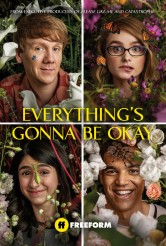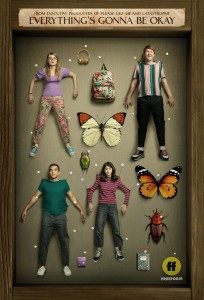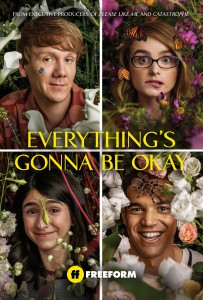
Maeve Press as Genevieve, Kayla Cromer as Matilda, Josh Thomas as Nicholas and Adam Faison as Alex in EVERYTHING’S GOING TO BE OKAY Season 1 | ©2019 Freeform/Pamela Littky
In Freeform’s new unconventional comedy series EVERYTHING’S GONNA BE OKAY, airing Thursdays and then available On Demand and on Hulu, a family reconfigures in a surprising way. Nicholas, played by series creator Josh Thomas, is in California visiting his dad (Christopher May) and two teenage half-sisters, Matilda (Kayla Cromer) and Genevieve (Maeve Press). It turns out that Dad is dying, but only now revealing it to his stunned offspring. More, he wants Nicholas to stay and be the guardian for the minor siblings. This would be challenging in any case, but Matilda is autistic, which adds a new wrinkle.
Thomas previously created and starred in the series PLEASE LIKE ME, which ran on Freeform for four seasons. Like his characters in that series and in EVERYTHING’S GONNA BE OKAY, Thomas is a gay Australian man. Unlike his onscreen characters, Thomas started doing professional stand-up comedy at a young age. In addition to creating and starring in EVERYTHING’S GONNA BE OKAY, Thomas is also the show runner and an executive producer. While he is cis-gendered (that is, he identifies as male, his birth gender), Thomas says he identified more with teenage girls than teenage boys as an adolescent.
Thomas sits down with ASSIGNMENT X and one other reporter to talk about all the hows and whys of EVERYTHING’S GONNA BE OKAY.
ASSIGNMENT X: When EVERYTHING’S GONNA BE OKAY came together, did Freeform coming to you and say, “Gee, we really love PLEASE LIKE ME, would you like to do something else for us,” or did you come up with this concept and then shop it?
JOSH THOMAS: I came up with the concept and then shopped it, but Freeform were pretty keen to take PLEASE LIKE ME on, they wanted to air it, and there were discussions about them taking on a Season 5, I really kind of felt like that show was finished, and also, [it would have been difficult to continue], because of contracts. So I have a longer relationship with them than I do with any other network. And them wanting PLEASE LIKE ME built a lot of trust for me, because that show, the same as this show, we spoke about issues, we spoke about things in a different way, and they really loved that, and that’s what they wanted. And so they were a really attractive choice for us.
EVERYTHING’S
AX: How is Nicholas, and how old are you in real life?
THOMAS: So I’m thirty-two. The character officially is twenty-five, and they used to have that in the press release, and I made them take it out, because I wasn’t sure it was that believable. So in the show, we don’t say.
AX: You look like you’re in your early twenties.
THOMAS: Oh, that’s nice. Thank you.
AX: Matilda is seventeen and Maeve is fourteen. What were you like at that age?
THOMAS: I was like so strange and all over the place. In that group [Maeve’s social circle in high school] that’s a girl seems like a bit of a bully, and I did a bit of that, and there’s a girl that got bullied, and I took a bit of getting bullied, and there’s Genevieve, who has a really similar voice to me, which is on purpose, and she kind of feels like she’s on the outside, and she’s looking around at life, and taking it in, and making jokes. To me, I kind of get all of their points of view pretty easily.
AX: Elements of PLEASE LIKE ME were autobiographical. Is that the case with EVERYTHING’S GONNA BE OKAY?
THOMAS: This doesn’t have a lot of autobiographical stuff. It’s research-based. I used to do stand-up, and in stand-up, you have to be a singular person, and you have to have a singular point of view. And I used to hate that, because I’m not that confident about my opinions, to be honest. And sometimes, when you do stand-up, you have to say them so confidently. But on this show, I get to have different characters, and I get to show all of my opinions. I get to show each side, and when we talk about issues, I like it, because I can [express a range of viewpoints]. There are two episodes that are about [sexual] consent and autism, which is a really challenging conversation to have. And to be able to have that conversation from four different characters’ point of view is to me what’s so exciting about writing a narrative television show.
What happened is, when I was doing our research, I had a lot of conversations with parents and caretakers of teenagers with autism, and [the adults] had a lot of anxiety about [sexual behavior]. One of the guys who works on our show has a teenage daughter. He had a lot of anxiety about her, and her growing up, and guys taking advantage of her, because she’s not that great at reading social cues. Those kinds of intimate relationships, obviously, they happen behind closed doors. And that scared the hell out of him.
But then when I spoke to girls who have autism, they’ve been really frustrated, because they’re people who want to be able to make their own decisions, and they’re grownups, and they have their own ideas of what’s good for them, and they need to be able to be free to explore that. And the tension between those two points of view that are so valid – that parent is so right, and that person with autism is so right – is I think a really challenging conversation. So we do a two-episode arc about it, which I would say is a pretty long arc for a consent chat [laughs]. And what I like about narrative television is, for me, to give a cemented opinion about that would be impossible. But in the show, we get to give lots of different points of view, and create an environment where people can watch it and think about it and decide what they think for themselves.
AX: Matilda is seventeen. Is that above the age of consent in California?
THOMAS: It’s a misdemeanor. But the legality of it, I think, for most people isn’t as important as the morality of it. I think most people don’t find an eighteen-year-old having sex with a seventeen-year-old particularly morally uncomfortable, even though the law takes a different view. But yeah, that’s a part of the conversation as well. So that’s what I like. There are ways to explore viewpoints, or different characters have different pieces of me, or different points of view that I would have, and I get to share them.
AX: You’re playing a father figure in EVERYTHING’S GONNA BE OKAY. How has that been to write and to play?
THOMAS: I found it really fun to imagine, how would I go about this? And when I write my character, that’s what I think. In the show, he’s really keen to treat them as friends, as equals. And as the series goes on, he realizes, actually, they’re children, and they need guidance, and he’s the only person that can provide that. And I think that’s interesting, because I as the writer went on the same journey that he goes on. When we started writing this season, I was very passionate that he wouldn’t be able to parent them that strongly, that he needs to treat them as equals, and he needs to treat them as friends, and he chooses to sort of treat them as grownups even though they aren’t. And then as we wrote the series, I came around to realizing that he needs to step up in some ways, and that’s what kind of ends up happening.
AX: You’re also a producer and the show runner. Is that like parenting?
THOMAS: I think it’s like, sometimes it’s frustrating, because the actors sit around at lunch and eat sticky-date pudding, and go over their lines, and they get to do all these nice bonding things, and I’m in budget meetings, or I’m on the phone to the network, trying to convince them that actually it is a good idea to have three people on the [autism] spectrum have a threesome. But I’m in a different head space. I try to be really careful with my acting to be in the scene and be present, and I try not to give too many notes. We have a director, and I try and lean on them. Sometimes I step in, but as much as possible, I try not to. I mean, the synchronicity between being the show runner and playing somebody who is the parent really helps, actually. It’s made it interesting. That kind of weird on-set power dynamic that otherwise might be really challenging for us creates a sense of chemistry [laughs]. Because they are in the scene, looking to me like, “Does this work?” the same way they should be in real life, so we kind of got lucky in that way.
AX: There’s a scene in the first episode where Nicholas is with his father, who has just explained he’s dying. The father wants to talk about the family budget, and Nicholas want to do anything but that. Did that come out of you doing the budget meetings for the show?
THOMAS: [laughs] I actually love budget meetings. Honestly, I do. That scene came out of something, but I can’t remember what.
AX: Is the father character in EVERYTHING’S GONNA BE OKAY anything like the father in PLEASE LIKE ME, or your real father?
THOMAS: My dad’s alive. They’re not the same. I think the dad here and the dad in my last show and my real dad have this through-line of being men that aren’t really that sure what to do with their feelings, and show love in a weird way, which is I guess how I view straight men, no offense. This dad [in EVERYTHING’S GONNA BE OKAY] is really different than the dad in PLEASE LIKE ME]. And they have a different relationship as well. They’re kind of more distant. But they’re all fictional.
AX: Is one of the reasons you made both of Nicholas’ siblings female because you find straight guys weird?
THOMAS: Yeah. We have one white, straight man, and we kill him in the first twenty minutes [laughs]. Straight men are kind of aliens to me. I don’t feel that comfortable writing them, to be honest. [laughs] I don’t really get why they do what they do –
AX: It’s not the sexuality, it’s the rest of the behavior that’s kind of strange?
THOMAS: I just find it a lot easier to write women. I don’t really know what [heterosexual] teenage boys do [laughs]. We have some teenage boys in the show, and I’ll run up to them and try to find an activity for them at lunchtime, and I’ll say, “What do you guys do? What do straight boys do at lunchtime?” I don’t know, I never saw it. all my friends in high school were female. My best friend, who was in my last show, Tom [Ward], he was straight, but he was a different breed of straight guy. People would talk about male writers, and how they write women poorly, and it’s offensive that they do that, and I am the same level of offensive about straight men, and it’s something I probably need to work on.
I just didn’t hang out with straight men. All of my awkwardness as a boy when I was a teenager was so wrapped up in my queerness and my ADHD, I would say. And so I feel like I’m in this weird position where I have to learn how to write straight men better, which is the opposite of most writers.
There’s maybe a confidence [to heterosexual males]. But I would never write guys that are self-confident. I don’t want to watch them, regardless of sexuality or gender. I’m not really interested. All of my characters are a bit neurotic. They’re weirdos, they’re outlaws, they’re outsiders. That’s what I love. I guess when you love weirdos and outsiders, maybe I’m just not that good at including them. I wish I was better, honestly. I don’t think it’s fair. I don’t think it’s not fair to not include straight men [laughs]. I think everyone deserves a seat at the table.
AX: Does Matilda’s family see her as especially odd? They all seem a little idiosyncratic …
THOMAS: My experience of families that have someone on the [autism] spectrum is that most other people in the family are sort of spectrum-adjacent. So the father to me is not on the spectrum, he’s spectrum-adjacent. Nicholas is as well, and I think Genevieve is as well.
AX: Is it easier to write Matilda than other characters because you know that her take is always going to be the truth as she sees it?
THOMAS: That’s not necessarily true of people with autism. Some people with autism are really good at lying. The thing that was easy, actually, about writing a character with autism is that it’s very easy to research. They write books about it. They write books about teenage girls with autism. They write lists – “Twelve Most Challenging Things That Teenage Girls With Autism Have To Go Through.” And it’s like, well, great. You just did my series arc. Thank you. The teenage girls are harder and more nuanced, actually. To try to figure out what teenage girls are doing now is a harder question for me to research.
AX: What would you most like people to know about EVERYTHING’S GONNA BE OKAY?
THOMAS: I just think it’s a nice show, but it’s for a specific kind of person that will really like it. It’s not for everybody, it’s not meant to be for everybody, and that’s great. That’s cool to me.
This interview was conducted during Freeform’s portion of the Winter 2020 Television Critics Association (TCA) press tour.
Follow us on Twitter at ASSIGNMENT X
Like us on Facebook at ASSIGNMENT X
Article Source: Assignment X
Article: Exclusive Interview with EVERYTHING’S GONNA BE OKAY creator and star Josh Thomas on Season 1
Related Posts:













